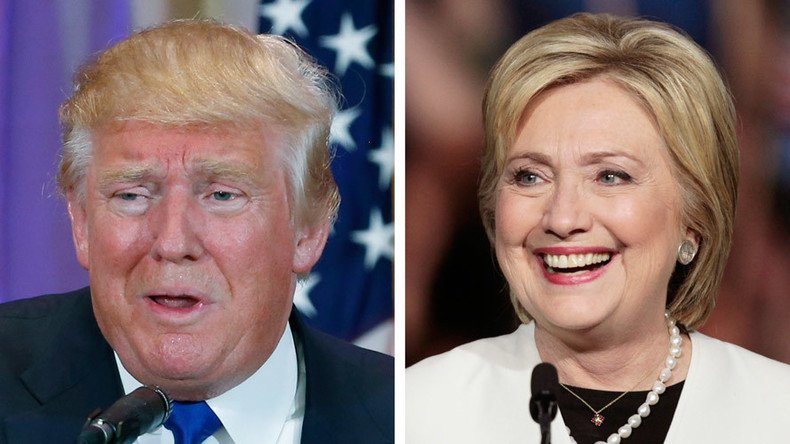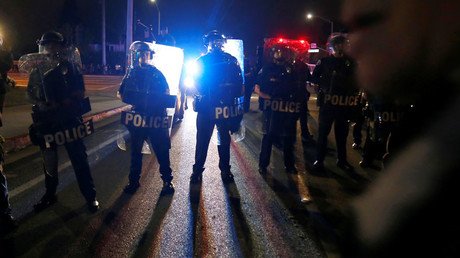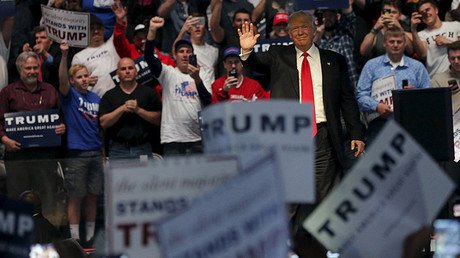US presidential elections: A view from the Middle East

Although the era of US global hegemony is coming to a close, the Middle East – more than most regions – is still reeling from the nasty last jabs of that Empire in decline.
It is little wonder, then, that the US presidential election season is scrutinized carefully in all corners of the Mideast.
Over here, the debate over the likely victor is less about economic, political and social projects than it is about which candidate is least likely to launch wars against us.
Anecdotally, there seems to be a consensus that Hillary Clinton would be the worst for the region, though of course – like in the United States – that perception changes dramatically when the conversation is with regional elites and ‘liberals.’
And just like their American counterparts, Middle Easterners get bogged down in arguments about Donald Trump’s ‘racism,’ Bernie Sanders’ ‘viability’ and Clinton’s ‘hawkishness.’ Media, after all, has never been more uniform in its pronouncements – we all, universally, receive the same talking points.
But US Presidential Election 2016 means a lot more than US polls in decades past. From the Levant to the Persian Gulf to North Africa, borders have never been so frayed, terrorism so pervasive, security and resources so threatened.
The Middle East is a wretched mess. And at the heart of each and every one of these quagmires stands the United States, imposing itself, its military ‘expertise’ and its humanitarian ‘do-gooding’ into our suffering. Ironically, perhaps, there are few problems in the Mideast that have not been caused or exacerbated by the destructive hand of US foreign policy.
The last playground
The Middle East is the last global playground where the US can act with impunity. Part of the reason for this is that most of the two dozen states that make up the region are still headed by US-backed dictators and monarchs – American proxies that prioritize Washington’s interests over those of its citizenry. The US plays hard in this region because it wishes to maintain this remarkably favorable status quo, which it has lost virtually everywhere else.
Even as the Cold War was drawing to a close - vanquishing the old Soviet bloc proxy leaders in the Mideast and replacing them with US-friendly ones - the 1979 Iranian Revolution flipped the region once more, ushering in a new framework for independence from the ‘Anglo imperialist.’
In the aftermath of Iraq’s war with Iran, which had placed Iranian aspirations on hold for eight long, destructive years, Tehran began to forge regional relationships that formed the underpinnings of a new Axis of Resistance to US and Western hegemonic ambitions.
The US expanded its military role in the Middle East mainly to eradicate this ‘Shia’ thorn in its side – but it has not only failed to do so with each consecutive US administration, it has willfully unleashed the well-contained demons of sectarianism to achieve this goal.
Hello, Sunni Wahhabi fundamentalism. Hello, Al Qaeda. Hello, ISIS.
Why even get into this recent history? It’s important for one main reason. Even as the US now turns its guns on the Frankenstein monster it created from its invasions of Afghanistan, Iraq, Libya and now its intervention in Syria… Washington also has its guns aimed at Iran, Syria, Hezbollah and other entities that are fighting this very terrorism.
When Trump debuted his foreign policy vision earlier this week, he pointed out that current US policy was “reckless, rudderless and aimless” – “one that has blazed the path of destruction in its wake.”
It’s all we’ve heard in recent years – certainly since the start of the Arab ‘uprisings’ – with pundits and commentators alike scratching their heads in confusion over US goals in the region.
American policy is not confused – it is very deliberate. Get your head around this: Washington seeks to thwart the Iranian-led axis by unleashing sectarian, Wahhabi-influenced extremists into parts of the region viewed as Iran’s strategic depth, AND it seeks to counter the proliferation of these extremists by reaching out to Iran, tactically – hence the sudden P5+1 nuclear deal in the midst of all this conflict.
This is what I call America’s “strategic dissonance” – playing both sides to engineer protracted conflict in an effort to gradually drive the two sides into extinction.
Only problem is the unpredictability of it all – and the ensuing chaos, destruction and terrorism that has now poured over these borders into Europe and beyond.
Mr. America versus Ms. Beltway
It is clear that this strategic dissonance has once more led to an American “unintended consequence.” It is equally clear that it will take nothing less than a sledgehammer to alter the destructive bent of US foreign policy.
What’s interesting about this election year is that voters have put their backs behind unlikely candidates Bernie Sanders and Donald Trump, mostly, it seems, to buck the establishment.
The two long-shot candidates have delivered scathing reviews of Beltway politicos and the ‘interest groups’ that prop them up – foreign and domestic, both.
Trump calls Israel only true democracy in Middle East, critical of Obama policy. WATCH: https://t.co/Yn1gNtELzMpic.twitter.com/sEHvrU3iMT
— RT America (@RT_America) April 27, 2016
By contrast, Hillary Clinton – the ‘deserving’ establishment candidate who was a shoo-in until a few short months ago – has had to fight for every vote in her contests with Democratic Party newcomer Sanders.
And the easiest blows against Clinton have been in the foreign policy arena, where the Beltway hawk has a long record of backing the wrong plan – in Iraq, in Libya, in Syria.
In the Mideast, Clinton’s militaristic leanings scuttle any goodwill one would otherwise have for a Democratic Party candidate. Egyptians lobbed tomatoes, shoes and water bottles at her motorcade when the then-secretary of state made an appearance after the ousting of longtime US ally President Hosni Mubarak.
It was under her stewardship at the Department of State when “foreign hands” began to make their marks on the Arab uprisings – none to the benefit of the Arab masses.
Her support for the ill-conceived US invasion of Iraq, which led to the establishment of Al Qaeda in that country, is a constant refrain here in the Mideast – much as it is in the United States. And her refusal to acknowledge the disastrous consequences of US military intervention in Libya remain proof that she never learned from Iraq.
Like him or not, Clinton’s maniacal laughter over Libyan leader Muammar Gaddafi’s violent death as she sanguinely declared“We came, we saw, he died,” has been forever imprinted on our collective memories.
We have since learned that US President Barack Obama’s decision to militarily intervene in Libya came down to her vote. Libyan blood cannot be washed off those hands.
And now Clinton wants to escalate in Syria by carving out a “safe zone” – which is how her Libyan adventure started.
If Clinton suffers from a likeability problem in the US, she is downright reviled in the Mideast – except among the usual suspects which include dictators, monarchs and other super-wealthy elites who have either contributed to the Clinton Foundation or are desperate to maintain their cushy positions within a US-dominated region.
Then there’s Trump
The highly controversial billionaire businessman Donald Trump has been roundly bashed in this region for his prejudicial comments against Muslims, but there’s a quiet parade of thinkers in the Mideast – from Arab nationalists to progressives to intellectuals – who have been casting coy second glances his way.
This was a serious foreign policy speech by Trump. It is worth reading and thinking about. It will be ridiculed by Washington elites.
— Newt Gingrich (@newtgingrich) April 27, 2016
“Trump can turn the system upside down,” says a leading Lebanon-based Arab nationalist. “He’s his own man, he will not be dragged into the trappings of the deep state,” says an influential writer.
“Who else is willing to put the brakes on NATO, disengage from lousy alliances, hook up with Putin and others to fight terrorism the right way, prioritize diplomacy over military options? Not Clinton, no way,” a college student rants.
There is that.
Unlike Clinton, there’s not much we know about Trump. He has no foreign policy record, except of course his non-stop reminder that he opposed the US invasion of Iraq and warned that it would be a “disaster.”
But if you’re going to take a chance on a candidate – if you’re going to try to read between the lines of campaign promises – I suggest taking the unconventional, risky declarations more seriously than predictable, voter-friendly platitudes like “I support the state of Israel unconditionally.”
GREATEST FOREIGN POLICY SPEECH SINCE WASHINGTON'S FAREWELL ADDRESS.
— Ann Coulter (@AnnCoulter) April 27, 2016
And Trump has some doozies.
On key US ally Saudi Arabia, arguably ground zero for the militant extremism rampant in the region – and a country that former Defense Secretary Robert Gates says was prepared to “fight the Iranians to the last American” – Trump warns that he might halt purchases of Saudi oil unless Riyadh commits ground troops to the ISIS fight. His comments mirror those of Gates – as disclosed in a 2010 Wikileaks cable – who said of the Saudis that it “is time for them to get in the game.”
“If Saudi Arabia was without the cloak of American protection, I don’t think it would be around,” suggests Trump, quite correctly.
On Russia, Syria and US support of rebels: “Putin does not want ISIS. The rebel groups… we have no idea who these people are. We’re training people, we don’t know who they are… we’re giving them billions of dollars to fight Assad… If you look at Libya, look what we did there, it’s a mess. If you look at Saddam Hussein, with Iraq, look at what we did there, it’s a mess…”
In what seemed like a swipe at US support of questionable militants in Syria and elsewhere, Trump says: “We need to be clear sighted about the groups that will never be anything other than enemies. And believe me, we have groups that no matter what you do, they will be the enemy. We have to be smart enough to recognize who those groups are, who those people are, and not help them.”
Asked if the Mideast would be more secure if Saddam and Gaddafi were still around and Assad were stronger, Trump boldly declares: “It’s not even a contest…Of course it would be.”
And this: “I like that Putin is bombing the hell out of ISIS. Putin has to get rid of ISIS because Putin doesn’t want ISIS coming into Russia.”
Hillary PAC spending $1m to ‘forcefully correct’ social media trolls https://t.co/hSSrTFL5V0pic.twitter.com/E2cjkAEBTt
— RT America (@RT_America) April 22, 2016
In short…
Trump is an unknown quantity, but he is delivering some home truths to restive voters in an unconventional election year.
Clinton is the quintessential establishment candidate, the sure-thing that voters wish they could like, who is running for president at the wrong time for a beltway insider.
Trump has defied all the odds thus far, and there is no reason he can’t continue to do that all the way to the White House. Whether or not he can keep surprising once he is there is anyone’s guess. Will he become co-opted by the system? Will he strike down entrenched Washington dogmas with his trademark arrogance? Nobody knows.
If Trump runs against Clinton, his campaign mantra has to be “Clinton: tons of experience, no judgment.” It’s pretty much the only way he can compete with a seasoned politician who is sure to throw his inexperience back in his face at every opportunity.
For the Mideast, this is not the time to pick the ‘devil we know.’ We know how that story ends every single time: destabilization, chaos, terrorism.
Trump is definitely the lesser evil, whichever way one looks at it. He simply cannot be worse than her.
But there is one solitary upside to a Clinton presidency. If Hillary Clinton is the next president of the United States… we will see the world shift decisively into a new multi-polar order. The battle over Syria became a red line for the Russians, Chinese and Iranians, and they placed protective arms around key states, in turn forging closer relations with each other – some of these, military dimensions – and with a number of other ‘middle powers’ that threatened to up-end US hegemonic ambitions once and for all.
Imagine then, the reactions of Russia, China, Iran, Brazil, South Africa and other states irked by US-backed destabilizing campaigns, if a hawk like Clinton is ensconced in the White House.
We’ll slip into a new world order faster than you can say 'Goldman Sachs.'
The statements, views and opinions expressed in this column are solely those of the author and do not necessarily represent those of RT.















